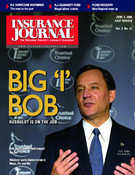Rusbuldt, chief executive officer of the Independent Insurance Agents and Brokers of America, needs no introduction to independent agents, insurance company executives or the power brokers in Washington, D.C., before whom he regularly champions agents’ causes and concerns, from compensation disclosure to terrorism insurance, market penetration to technology.
He is also becoming known to agents around the globe. Over the past few years, IIABA has become an international organization. China, Canada, Italy, Japan, Mexico and Puerto Rico all have associate membership programs underway.
In this exclusive interview with Insurance Journal’s Andrew Simpson, Rusbuldt speaks out on recent class action settlements on compensation that have left Main Street agents out of the loop; how he wants to boost agents’ personal lines market share; his organization’s growing international flavor and what’s in store for agents if Democrats gain control of Congress.
The complete video interview may be viewed on Insurance Journal’s Web site at www.insurancejournal.com.
The latest IIABA market share report is out. What does the latest survey tell you about agents and their market share?
Rusbuldt: Andy, the survey shows that independent agents’ market share continues to grow for the eighth year in a row. Many predicted the demise of the independent agency system over the last 20 years, and yet, they have been proven wrong. We are not candlestick makers, and in fact, now there is a renaissance in the independent agency system. Independent agents are growing every year, for eight years, in both commercial lines and personal lines. In commercial lines now, the independent agency system is approaching 86 percent of market share.
That’s incredible.
Rusbuldt: That is incredible, and we continued to grow by fractions of a point every year. In personal lines now we are approaching 36 to 37 percent. That doesn’t sound like a lot, but considering just a few years ago we were in the low 30th percentile, there has been significant growth. Every percent we grow in personal lines is $4.5 billion in premium. We are talking real money here for independent agency companies; we’re talking real money for independent agents; we continue to grow and there are clearly a lot of reasons for that.
What do you think the key is to boosting that personal lines market share?
Rusbuldt: First of all, it’s my personal goal for our distribution system to get 50 percent market share, and people say, “Bob, I think you might be a little optimistic,” or “What are you drinking?” But the bottom line is that we can do it; we offer personal service, value, advice, council and advocacy. We do things that direct writers don’t do. I think, at the end of the day, as Americans become more distracted, more busy, more absorbed in their personal lives, professional advice and counsel from a trusted adviser is going to be key in growing that market share in personal lines. It will happen, and I think we’re going to see that over the next few years.
Weren’t agents supposed to be out of business, with the advent of the Internet and purchases online?
Rusbuldt: The interesting thing is that agents are using the Internet, so while you have a lot of direct writers that use the Internet, and very effectively, we have independent agents that are doing the exact same thing. You’re seeing independent agents becoming 24/7 on the Internet working with our company partners, you’re seeing their very sophisticated Web sites now marketing on the Internet; so we’re using the Internet as a tool and frankly, instead of fearing the Internet we have embraced the Internet to increase our market share.
At the Big “I” National Legislative Conference there was a representative from Italy. Could you talk about the outreach that the Big “I” is doing to other countries, and building agency systems in those countries?
Rusbuldt: We have Big “I” members, nearly 30 in Japan; we have one in the Dominican Republic, the largest broker in the Dominican Republic, Luis Ross, who is here for our legislative conference; we have agents in Italy, some that are here; we have agents in News Zealand, in the Philippines and other countries around the world. The reason that they are joining the Big “I” is because of things that we offer them that they find of value; things like the virtual university, which transcends geographical barriers. They can get education online. They can have answers to questions about the international and American markets when they have technical questions. We have things like IA Magazine that they find very useful. We have best practices. Whether you are an agent or broker in Italy, or the Caribbean, or Asia, best practices for businesses are the same everywhere. When they can learn from the best of the best around the world how to increase their revenue, how to increase their efficiency, how to increase their market share in their local communities, they find value in that.
Do you see an international Big “I” some day?
Rusbuldt: It already is. We have members in numerous countries now, and so we are already international. Our Board of Directors, about six years ago, decided to accept international membership and we have been growing every year.
Back home, here in the states, there was a recent class action ruling affecting Zurich Insurance Company, under which Zurich agents, regardless of the state they’re in, will have to disclose some compensation. I’m wondering about your opinion on class action suits and the effect they have on agents in this area.
Rusbuldt: First of all, we are very concerned about the settlement agreements, from what we know and what we’ve read. Second is, we were able to defeat onerous anti-agent/broker type legislation in state Legislatures, in Congress and in insurance departments around the country. Yet, the legal system and the attorney general, in these settlement suits, have implemented some very onerous things for agents and brokers. The primary problem that we have is the disclosure requirements could create a Bosnia like situation in independent agencies. If you have 10 large carriers in your agency, and each one of them has a different disclosure form, each one of them has different requirements for timing of disclosure, if each of them have different requirements for what has to be disclosed, you clearly create a huge inefficiency in an independent agency. That is unacceptable. We are trying to become more efficient, more competitive and yet these settlements could take us in the opposite direction, so we are very concerned about that.
Unfortunately, independent agents are not represented at the table. It was the company and their lawyers and the AGs and some lawyers for insurance regulators. So we found out about this at the same time as everybody else. We are also concerned in the settlement agreements, that when you reach a certain threshold, contingencies go away in those companies. That is a huge problem for a lot of agents and brokers. Contingency income, or incentive compensation is the way American businesses do business. We have been doing business like that for hundreds of years. Incenting your sales or distribution force is what it is all about in the United States, free market. So, we are very concerned about these settlement agreements and where they are going.
Is there anything that can be done to change those?
Rusbuldt: You would have to talk to the company that is involved, you would have talk to the Attorney General and you have to talk to the insurance departments. What we are looking to do is make sure that onerous settlement agreements don’t happen in the future. But we are not a party to these. There were crimes or unethical practices committed in some instances. We don’t want to see the honest people that weren’t involved in any of these unethical or illegal behaviors be penalized and have their cost driven through the roof for things they had no involvement in.
You are [in Washington] for your legislative conference and I understand close to 1,600 or more agents showed up and have had an opportunity to sit down and talk with their elected representatives. The next time they show up, do you think Democrats might have a stronger say in what policy goes on here?
Rusbuldt: You know, it’s a possibility. Nobody knows, right now, what’s going to happen in November. This is going to be a very, very important election for our country, for our economy and for the insurance industry. If you turn over the House or the Senate, it makes a difference on who the chairman is, who controls the agenda, what legislation comes to the floor, whether it is regulatory reform for the insurance industry, whether it is asbestos litigation reform, whether it is flood insurance reform, crop insurance, tort reform — all of these issues that are crucial to the insurance industry will be affected one way or the other, depending on who controls Congress. So it’s very important. You would have Congressman Barney Frank from Massachusetts, who would be the chairman of the House Financial Services Committee. You would have Congressman Charlie Rangel from New York be chairman of the House Ways and Means Committee, which controls all tax and trade issues. So it makes a big difference.
I’m not going to make a prediction right now. To be perfectly honest with you, if you talk to some of the experts right now in the Republican National Committee and Democratic National Committee, both sides agree on one thing, and that is that Republicans will likely lose seats. They don’t agree on who would control the House and the Senate afterwards. The Republicans saying they will maintain control, but lose some seats, the Democrats say they’re going to take over both.
View the complete interview at www.insurancejournal.com.
Topics Agencies Legislation Talent Market Independent Agencies
Was this article valuable?
Here are more articles you may enjoy.


 BMW Recalls Hundreds of Thousands of Cars Over Fire Risk
BMW Recalls Hundreds of Thousands of Cars Over Fire Risk  Viewpoint: How P/C Carriers Can Win the Next Decade With Tech + Talent
Viewpoint: How P/C Carriers Can Win the Next Decade With Tech + Talent  How One Fla. Insurance Agent Allegedly Used Another’s License to Swipe Commissions
How One Fla. Insurance Agent Allegedly Used Another’s License to Swipe Commissions  AIG’s Zaffino: Outcomes From AI Use Went From ‘Aspirational’ to ‘Beyond Expectations’
AIG’s Zaffino: Outcomes From AI Use Went From ‘Aspirational’ to ‘Beyond Expectations’ 


